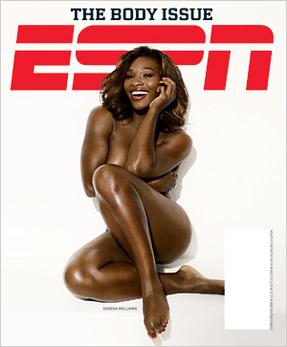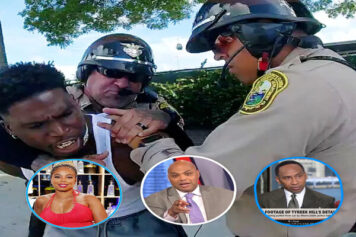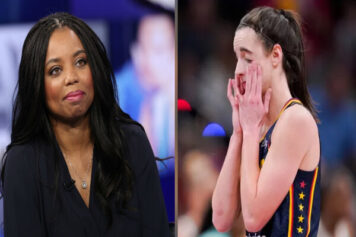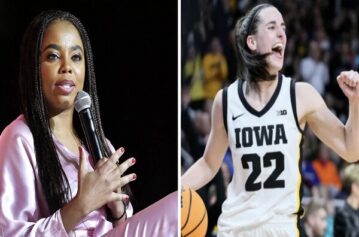This is the first profile in our TSL Leadership Series. This series features individuals who have worked hard, overcome obstacles, exceeded expectations and become successful leaders in the world of sports. We will profile the most interesting, entertaining, knowledgeable, unique and inspirational personalities in the field, those who are leading the charge and inspiring others to follow.
Read TSL Leadership Series: Diary of Jemele Hill, Part I here
Read TSL Leadership Series: Diary of Jemele Hill, Part II here
In Part 3 of TSLs Leadership Series with ESPN personality Jemele Hill, the sports guru discusses the evolution of sports journalism, sheds some light on opportunity and race in sports media and offers some juicy details on how being a woman in a so-called mans game can get a bit complicated at times. Shes just dropping more gems on ’em.
Jemele Hill on dealing with people who say mean, sexist or racist things about her work:
“It doesn’t bother me personally. It’s just irritating. There are a lot of amateur TV producers and “wanna be” commentators out there. I don’t mind people disagreeing with me. Hell, that’s the beauty of sports. I get pissed off by people who have zero training, but swear they are better at your job than you are. A lot of those cats talking trash would freeze when that red light comes on. Not to mention they don’t understand how much work we put into this. We’re not fans. Fans can consume sports however they want and on their terms. I don’t have that luxury. I have to watch everything, on top of reading tons of articles, columns and research packets so that I’m armed with as much information as possible.
Now I’m not asking anyone to feel sorry for me. I love what I do. But unfortunately when you’re a woman in this business, your margin of error is different. And anytime you say something unpopular or you have an aggressive opinion, someone will tell you to shut up because you’re a woman and you don’t know anything. You have to have thick skin. And I hate saying that because it gives the jerks out there a pass. I shouldn’t have to get used to it. They should just stop it.”
Jemele Hill on sports journalism in 2015:
The games changed since I started in newspapers in the 90’s. A lot of the young journalists have one goal — get to ESPN. I get it, because ESPN is embedded in our culture. That’s all they know. So a lot of them are trying to “build a brand” without a foundation. They don’t understand it’s about the work. It’s about developing sources, telling people things they don’t know and disseminating information accurately. ESPN is a great place, but it’s just a destination. I tell them the best way to wind up at ESPN is to not try to work at ESPN. Just focus on being good. I also think today’s journalist has to be a utility player. They have to know how to report for different mediums, from blogging to radio. When I was coming up, all I had to do was know how to write.
Jemele Hill on whether or not its gotten easier for African-Americans to become major players in this business?
Yes and no. There is a broader range of outlets than there were when I was coming up as a journalist. There also are more opportunities and options to start your own thing. And because of social media, we’re more aware of broader cross sections of people and perspectives.
However, new media isn’t exactly diverse. They don’t recruit the way newspapers used to do it. They don’t cultivate talent through minority journalism programs, recruit at HBCUs or set up recruiting booths at minority journalism conferences.

In some ways, journalism is actually becoming more elitist and thus alienating. Still…it’s not easy to become Stephen A. Smith, no matter what race you are. He paid a lot of dues and put in a lot of work. A lot of people don’t have it in them to hustle the way that he has throughout his career or deal with some of the setbacks.
Jemele Hill on the importance of a racially and ethnically diverse sports media:
Social media has made diversity that much more important. If the media is ignoring a story, or shaping a story in a manner that the public doesn’t buy, it creates this tidal wave on social media that can unleash a torrent of media criticism. We’re held more accountable now than ever before.
Movements have started on social media (for example: #BlackLivesMatter and #RapeCultureIsWhen). And if you don’t have reporters that understand people’s anger, frustration and perspective, then you will be outside the conversation. Or, you’ll find people flocking to social media, instead of a traditional media outlet. The media used to start and control the conversation and I’m not so sure that’s the case anymore. Now, we have to figure out a way to be included in it.

Jemele Hill on whether or not sports conglomerates such as ESPN appreciate the African-American viewer:
It’s taken for granted, and it’s often not reflected in the products being put on air. ESPN’s on-air diversity is recognition of that audience, but we aren’t perfect. In general, I think networks need to not only pay attention to the numbers — which shows the loyalty and huge consumption by African American viewers — but also how a particular sport connects culturally and socially. For example, the NBA.
Jemele Hill on athletes she has met or covered and developed personal friendships with:
Now due to the passage of time and because I’m not covering them anymore, I’ve developed great friendships with a lot of the guys I used to cover — Tom Izzo, Mateen Cleaves, Plaxico Burress, for example.

Probably the most surprising relationship I’ve developed is with Kobe Bryant. I wouldn’t dare overstate it and call us friends, but we’ve got a good rapport. I was critical of him after some comments he made about Trayvon Martin and he called me. I appreciated that because that’s how it was done when I was coming up as a print journalist. You had a problem with someone, and you talked to them. I kind of miss that back and forth sometimes. Anyway, we worked it out and while I still disagree with some of what he had to say, I was impressed by the dialogue and I appreciated that he cared so much about an important issue.
Kobe is my favorite athlete. He’s the last gunslinger. He used to be awkward, but I like that he feels comfortable enough to be brutally honest all the time. A close second would be Tom Brady or Serena Williams. I love their passion and fight. Like Kobe, they’ve reached a point in their careers where they feel less of a need to be guarded.

I had to wrap up this 4,000 word, priceless, three-part exclusive with a Q&A. There are certain questions that just needed to be asked. Things that the teenager in the barbershop to the yuppie with the smart phone are wondering about Juice Hill.
Who is your athletic crush?
I’m a professional, but let’s just say I’m not turning away from any Matt Kemp highlights.
Any big-time athletes try to get at you? No names but did you ever kick it with a well- known athlete?
Some have tried and while it’s flattering, I’m not interested. I’m concerned about how it might impact my credibility and on a personal level; my self esteem isn’t high enough to date a professional athlete. I’ve seen how the steak is made, so to speak. I think it was Chris Rock that said that a man is only as faithful as his options. Well, they have A LOT of options and I’m not one of those women who is going to have the “as long as he’s coming home to me,” attitude. I’m not built that way.
Are you happy with your career is at this point? What is your ultimate dream?
I’m happy, but I’m not satisfied. In this game, you have to love the process more than the result. So as much as I can appreciate what we’ve accomplished with His & Hers, all I can think about is how we can become the next PTI (Pardon The Interruption), ESPN’s most successful commentary show.
I don’t worry about my legacy. If I leave this profession and good things are said about how I approached the job, and my integrity, that’s enough for me.
Can we get a couple of juicy stories concerning athletes for the road?
I have an unofficial policy with athletes when it comes to social mingling. If we’re all somewhere and adult beverages are being consumed, then everything is off the record. In other words, I give them their space and they give me mine. And if we just so happen to socialize together, I think it’s perfectly fine if we forget our jobs for a night.
Certainly, it’s led to some entertaining stories. When I covered Michigan State, I was at a bar and saw a couple players out. I remembered they had a curfew, because it was a bowl trip. Well, it was past their curfew when I saw them. I offered to give them a ride back to the team hotel, which they gladly accepted. I told them I wouldn’t say a word, provided they didn’t get caught. And if they did, they couldn’t involve my name at all. The way I looked at it, it would have been far more annoying to have to write a story about them breaking a team rule.
And over the years, athletes have asked me to hook them up with some of my friends. And yes, they’ve introduced me to more than a few women who were not their wives. In either case, I sip tea and call Kermit.




